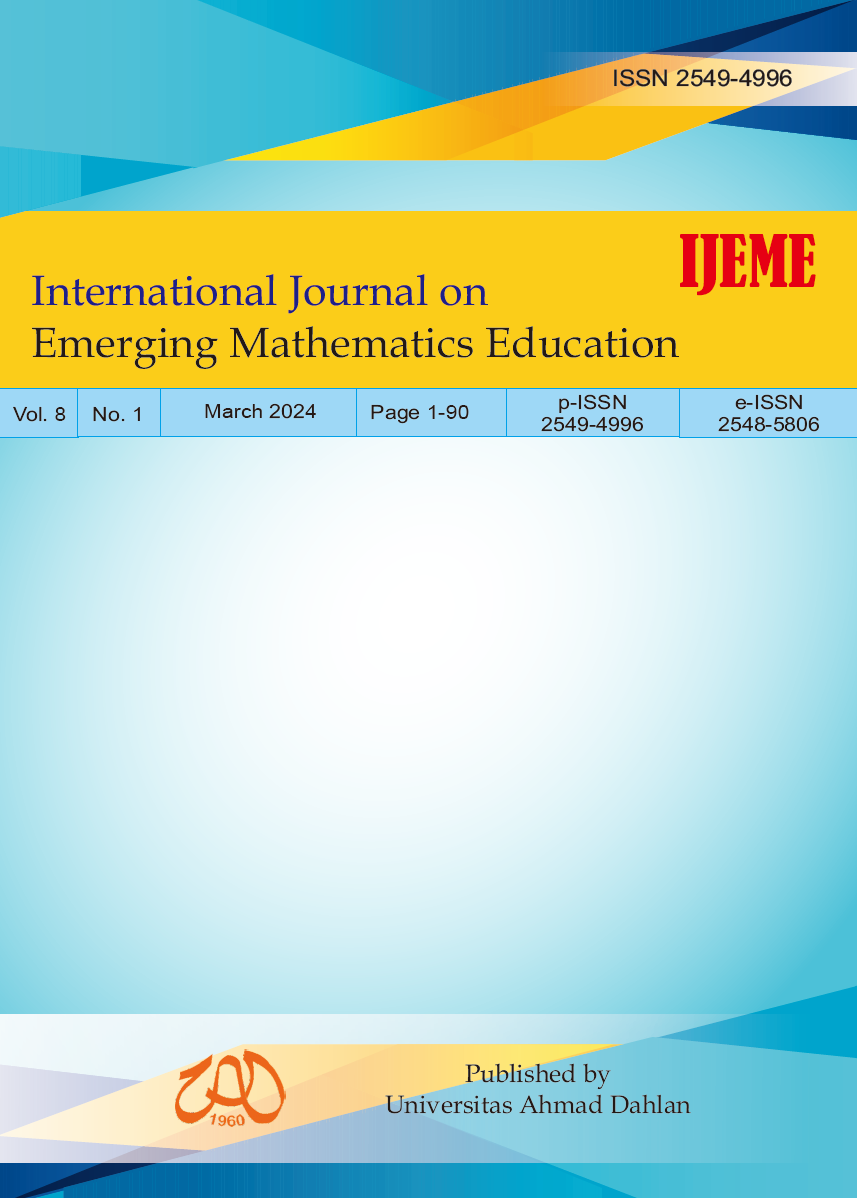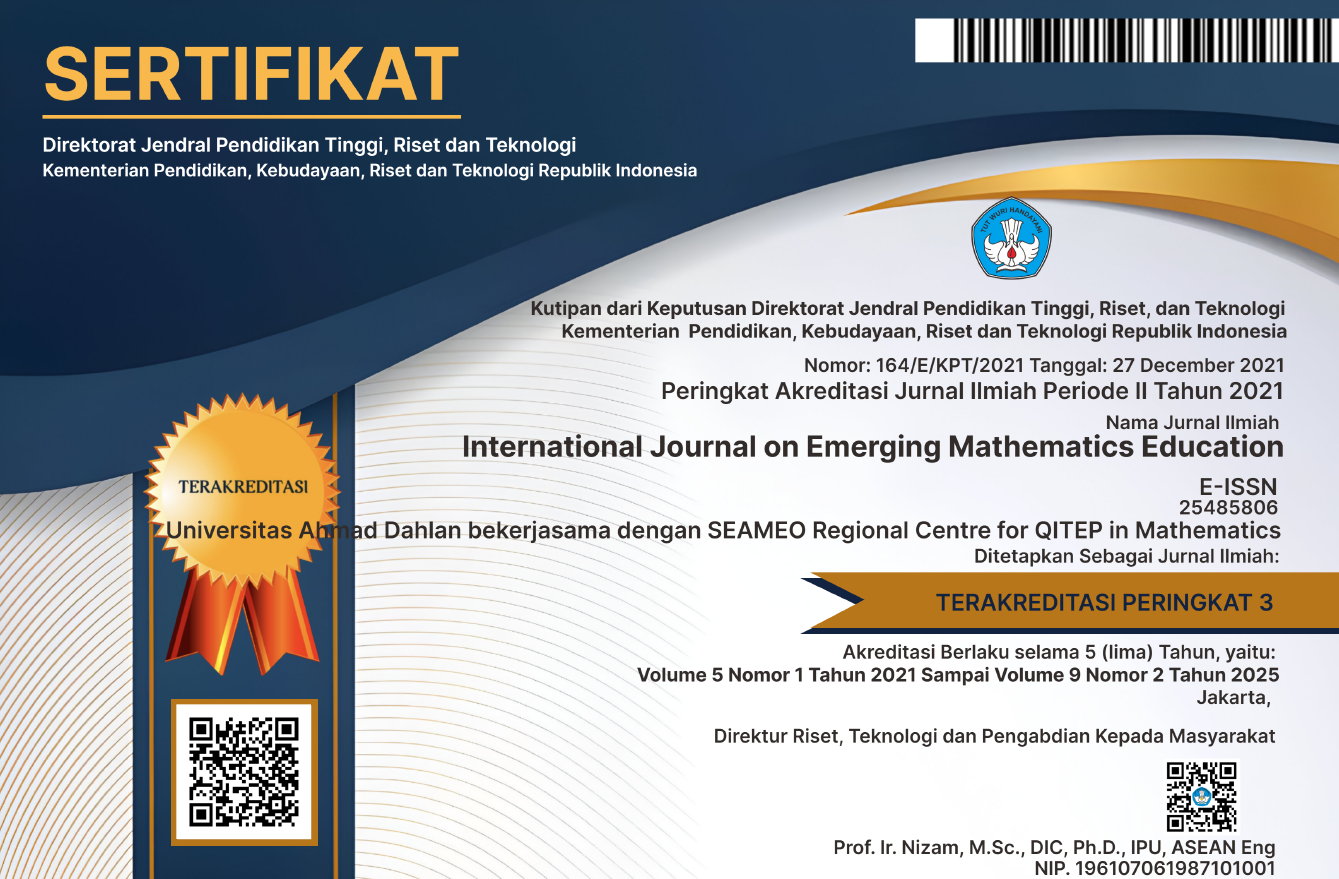Development of E-Worksheet with Guided Discovery for Slow Learners
DOI:
https://doi.org/10.12928/ijeme.v8i1.29587Keywords:
E-Worksheet, Guided Discovery Learning, Slow LearnersAbstract
Inclusive education was advocated as an education service system where students with special needs were required to study in nearby schools, participating in regular classes alongside their peers. Slow learner students were thus allowed to study at regular schools and were provided with the same learning materials as other regular students, based on the existing curriculum content. One of the materials studied was SPLDV material. SPLDV was identified as one of the materials that proved difficult for slow learners to understand and learn. This was because SPLDV material discussed contextual problems in their solutions, requiring understanding, logical reasoning, and coherent steps for solving. Consequently, solving SPLDV contextual problems required critical thinking skills. The study aimed to produce E-Worksheet based on Guided Discovery Learning that was valid and practical for improving slow learner students' critical thinking skills in SPLDV material. The research followed the ADDIE development stage (Analysis, Design, Development, Implementation, and Evaluation) and focused on grade VIII slow learner students at SMP Muhammadiyah 1 Pundong. Instruments included material expert validation sheet instruments, media expert validation sheet instruments, and student response questionnaires. Validation scores met "good" criteria, indicating validity and practicality for student and teacher useReferences
Afridiani, T., Soro, S., & Faradillah, A. (2020). Pengaruh model problem based learning (PBL) berbasis lembar kerja peserta didik (LKPD) terhadap kemampuan pemahaman konsep matematis. Euclid, 7(1), 12-21.
Ahdika, A. (2017). Improvement of quality, interest, critical, and analytical thinking ability of students through the application of research-based learning (RBL) in introduction to stochastic processes subject. International Electronic Journal of Mathematics Education, 12(2), 167-191.
Beyer, B. K. (1995). Critical Thinking. Fastback 385. Phi Delta Kappa, 408 N. Union, PO Box 789, Bloomington, IN 47402-0789.
Haris, F., Rinanto, Y., & Fatmawati, U. (2015). Pengaruh model guided discovery learning terhadap kemampuan berpikir kritis siswa kelas x sma negeri karangpandan tahun pelajaran 2013/2014. Jurnal Pendidikan Biologi, 7(2), 114-122.
Hutagalung, R. (2017). Peningkatan kemampuan pemahaman konsep matematis siswa melalui pembelajaran guided discovery berbasis budaya toba di smp negeri 1tukka. MES: Journal of Mathematics Education and Science, 2(2).
Imaludin, F.A., (2019). The Effectiveness of The Guided Discovery Learning (GDL) Method Using a Contextual Approach Reviewed From Mathematical Critical Thinking Ability Of Senior High School In Muna District. Jurnal Matematika dan Pembelajaran. 7(1), 22-34.
Kusumawati, E. (2015). Validitas LKS berbasis guided discovery pada materi pollutions and its sources. Berkala Ilmiah Pendidikan Biologi (BioEdu), 4(1).
Ridho, A. M. R., & Setyawan, F. (2022). Peningkatan aktifitas dan kemampuan berpikir kreatif melalui model pembelajaran discovery learning berbantuan e-modul. Action Research Literate, 6(2), 99-117.
Setyawan, F., & Firdaus, M. N. (2023). Analisis Kemampuan Berpikir Kritis dalam Menyelesaikan Masalah Matematika Ditinjau dari Kemandirian Belajar Siswa Kelas VII SMP Muhammadiyah 2 Yogyakarta Tahun Pelajaran 2019/2020. Didaktis: Jurnal Pendidikan dan Ilmu Pengetahuan, 23(1).
Setyawan, F., Handayani, T. K., Ratih, K., Sutopo, A., Rusli, T. I., & Alfiany, N. R. (2021). Rigorous Thinking in Mathematics Modelling for Slow Learners. In Journal of Physics: Conference Series (Vol. 1720, No. 1, p. 012005). IOP Publishing.
Shinta, E. M., & Triastuti, A. (2020). Communicative language teaching and its application in developing slow learners’ 21st century skills. Teacher Education and Professional Development In Industry 4.0, 261-266.
Siswanto, T. Y. E. (2018). Pembelajaran Matematika Berbasis Pengajuan dan Pemecahan Masalah Fokus pada Berpikir Kritis dan Berpikir Kreatif. Bandung: PT Remaja Rosdakarya.
Sugiyono, S. (2017). Metode Penelitian Kuantitatif Kualitatif dan R&D. Bandung: Alfabeta. Procrastination And Task Avoidance: Theory, Research and Treatment. New York: Plenum Press, Yudistira P, Chandra.
Widoyoko, E. P. (2019). Evaluasi program pembelajaran. Yogyakarta: pustaka pelajar, 238.
Yuliani, K., & Saragih, S. (2015). The Development of Learning Devices Based Guided Discovery Model to Improve Understanding Concept and Critical Thinking Mathematically Ability of Students at Islamic Junior High School of Medan. Journal of education and practice, 6(24), 116-128.
Downloads
Published
How to Cite
Issue
Section
License
Copyright (c) 2024 Poniyati Poniyati, Andriyani Andriyani

This work is licensed under a Creative Commons Attribution-ShareAlike 4.0 International License.
License and Copyright Agreement
In submitting the manuscript to the journal, the authors certify that:
- They are authorized by their co-authors to enter into these arrangements.
- The work described has not been formally published before, except in the form of an abstract or as part of a published lecture, review, thesis, or overlay journal. Please also carefully read the International Journal on Emerging Mathematics Education (IJEME) Author Guidelines at http://journal.uad.ac.id/index.php/IJEME/about/submissions#authorGuidelines
- That it is not under consideration for publication elsewhere,
- That its publication has been approved by all the author(s) and by the responsible authorities, tacitly or explicitly, of the institutes where the work has been carried out.
- They secure the right to reproduce any material that has already been published or copyrighted elsewhere.
- They agree to the following license and copyright agreement.
Copyright
Authors who publish with the International Journal on Emerging Mathematics Education (IJEME) agree to the following terms:
- Authors retain copyright and grant the journal the right of first publication with the work simultaneously licensed under a Creative Commons Attribution License (CC BY-SA 4.0) that allows others to share the work with an acknowledgment of the work's authorship and initial publication in this journal.
- Authors are able to enter into separate, additional contractual arrangements for the non-exclusive distribution of the journal's published version of the work (e.g., post it to an institutional repository or publish it in a book), with an acknowledgment of its initial publication in this journal.
- Authors are permitted and encouraged to post their work online (e.g., in institutional repositories or on their website) prior to and during the submission process, as it can lead to productive exchanges, as well as earlier and greater citation of published work.
![]()
Ciptaan disebarluaskan di bawah Lisensi Creative Commons Atribusi-BerbagiSerupa 4.0 Internasional.





